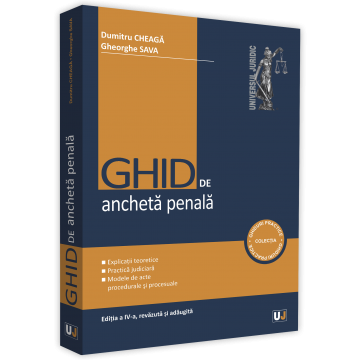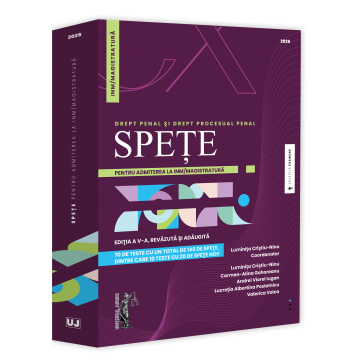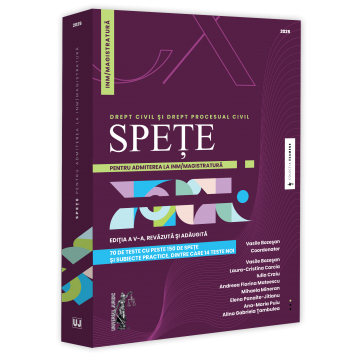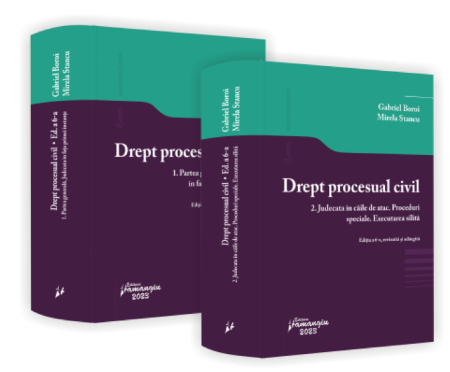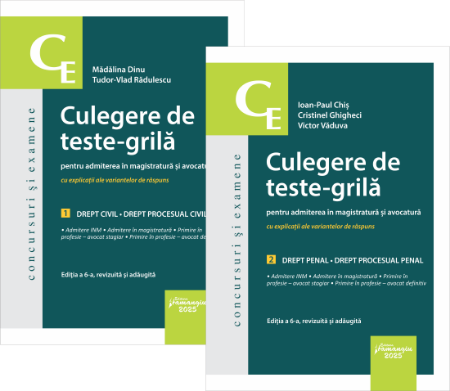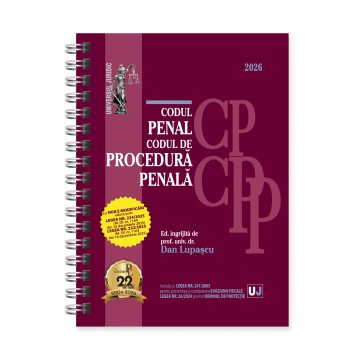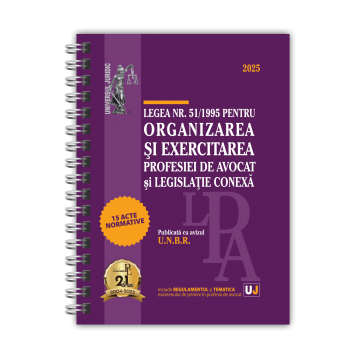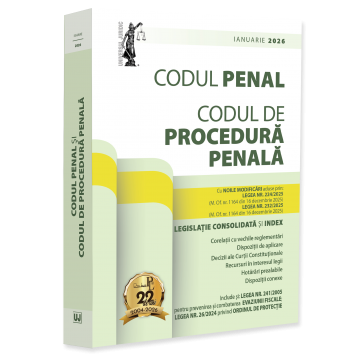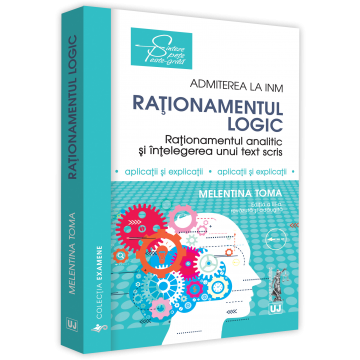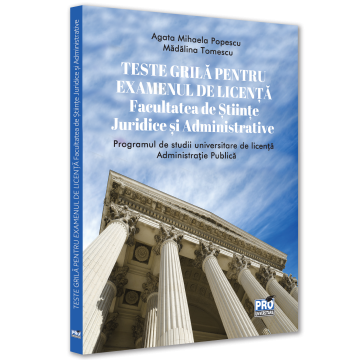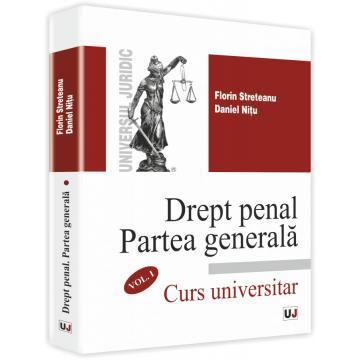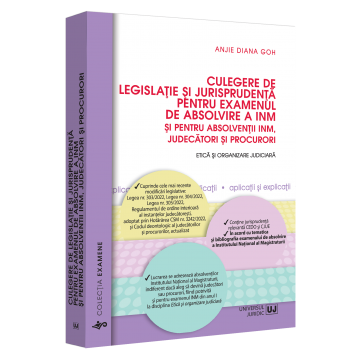Manuscript proposals: [email protected] / 0745 204 115 //// Tracking orders Individuals / Sales: 0745 200 357 / Orders Legal entities: 0721 722 783
ISBN: 978-606-28-0822-8
DOI: 10.5682/9786062808228
Publisher year: 2018
Edition: I
Pages: 166
Publisher: Editura Universitară
Author: Adriana-Maria Sandru
Product Code:
9786062808228
Do you need help?
0745 200 357
- Description
- Download (1)
- Authors
- Content
- More details
- Reviews (0)
The substantiation of the protection of human rights in the European Community and, more recently, in the European Union has benefited from the important and constant contribution of the Court of Justice of the European Communities.
The protection of human rights has been achieved in a pandectist way, through the integrative interpretations, pronounced by the ECJ, most of them in preliminary questions - within the dialogue between the European courts and the national courts. Indirectly, the national courts played an important role, as they forced the ECJ to deepen and rule, in most of them using the teleological method of interpretation.
The Court of Justice of the European Communities highlights a first stage, the stage in which, surprisingly, the first signs of an international judicial competition appear. The European Court of Human Rights - an institution recognized and with a substantial practice, consolidated in this field - was, and is, the benchmark against which the ECJ stood in pronouncing its decisions.
A first attempt to eliminate discrepancies between the interpretations of the two Courts was the accession of the EC to the ECHR. In its opinion, the ECJ rejected this possibility, although in some contradiction with its own judgments, in which the European Convention on Human Rights and the judgments of the Court are invoked.
The Treaty of Lisbon, institutional reform and the Union's competences propose the EU's accession to the ECHR without providing many legal, technical details and without leaving an important, almost unresolved issue of the hierarchy of international courts (more precisely, legal norms).
Human rights in the European Union are currently emerging as a changing field, moving from the EC to the EU - with a view to the entry into force of the Lisbon Treaty. At the same time, recent years have indicated interesting and important changes in the field of human rights within the third pillar, highlighted not so much by European legislation but especially by ECJ decisions.
The legal and political implications of recourse to one's own human rights jurisdiction, access to the subsidiary, and sometimes interpretable, provisions of the European Convention on Human Rights, may drive the process launched in 2000 by adopting the Charter of Fundamental Rights of the European Union - a worthless document mandatory legal (so far) and quite bushy.
The Treaty of Lisbon imposes the provisions of the Charter in the European system and puts us in front of a dilemma regarding the duality of the interpretations of the two Courts (ECJ and ECHR) in the field of human rights.
Product compliance information
The protection of human rights has been achieved in a pandectist way, through the integrative interpretations, pronounced by the ECJ, most of them in preliminary questions - within the dialogue between the European courts and the national courts. Indirectly, the national courts played an important role, as they forced the ECJ to deepen and rule, in most of them using the teleological method of interpretation.
The Court of Justice of the European Communities highlights a first stage, the stage in which, surprisingly, the first signs of an international judicial competition appear. The European Court of Human Rights - an institution recognized and with a substantial practice, consolidated in this field - was, and is, the benchmark against which the ECJ stood in pronouncing its decisions.
A first attempt to eliminate discrepancies between the interpretations of the two Courts was the accession of the EC to the ECHR. In its opinion, the ECJ rejected this possibility, although in some contradiction with its own judgments, in which the European Convention on Human Rights and the judgments of the Court are invoked.
The Treaty of Lisbon, institutional reform and the Union's competences propose the EU's accession to the ECHR without providing many legal, technical details and without leaving an important, almost unresolved issue of the hierarchy of international courts (more precisely, legal norms).
Human rights in the European Union are currently emerging as a changing field, moving from the EC to the EU - with a view to the entry into force of the Lisbon Treaty. At the same time, recent years have indicated interesting and important changes in the field of human rights within the third pillar, highlighted not so much by European legislation but especially by ECJ decisions.
The legal and political implications of recourse to one's own human rights jurisdiction, access to the subsidiary, and sometimes interpretable, provisions of the European Convention on Human Rights, may drive the process launched in 2000 by adopting the Charter of Fundamental Rights of the European Union - a worthless document mandatory legal (so far) and quite bushy.
The Treaty of Lisbon imposes the provisions of the Charter in the European system and puts us in front of a dilemma regarding the duality of the interpretations of the two Courts (ECJ and ECHR) in the field of human rights.
-
The legal regime of human rights in the European Union
Download
Adriana-Maria Sandru
CHAPTER I. EUROPEAN LEGAL INSTRUMENTS FOR THE PROTECTION OF HUMAN RIGHTS / 13
Section 1. Protection of human rights in the Council of Europe system / 13
1. European Court of Human Rights / 14
2. Committee of Independent Experts / 16
Section 2. Protection of human rights within the Organization for Security and Cooperation in Europe / 16
1. Relevance of OSCE actions in the field of human rights / 16
2. The Paris Charter for a New Europe / 19
CHAPTER II. THE EVOLUTION OF THE PROTECTION OF HUMAN RIGHTS IN THE EUROPEAN COMMUNITIES / EUROPEAN UNION / 21
Section 1. Progress in the assertion of human rights in Community treaties / 21
1. Preliminary clarifications / 21
2. Treaties establishing the European Communities / 21
3. Single European Act / 23
4. Treaty on European Union / 24
5. Treaty of Amsterdam / 28
6. Treaty of Lisbon / 30
Section 2. The third pillar of the European Union and the protection of human rights / 32
Section 3. Secondary community legislation - importance and specific directions / 41
Section 4. Evolution / community jurisprudence in the field of human rights / 41
Section 5. Recent / recent developments / European Union Agency for Fundamental Rights / 54
CHAPTER III. VOCATION OF THE EUROPEAN UNION FOR THE PROTECTION OF HUMAN RIGHTS / 57
Section 1. From freedoms to fundamental rights ("Economic Constitution") / 57
Section 2. Free movement of persons / 62
Section 3. Freedom of establishment / 74
Section 4. Maintaining the supremacy of Community law over constitutional provisions on the protection of human rights / 77
Section 5. Jurisdictional protection of human rights / 84
1. The role of natural persons in initiating the jurisdictional control of the ECJ in case of violation of fundamental rights / 84
2. Absence / Restriction / possibility of natural persons to initiate jurisdictional control of the ECJ in case of violation of fundamental rights / 91
Section 6. Non-jurisdictional protection of human rights / 93
1. Political control / 93
2. Non-political control / 95
Section 7. The importance of human rights in the external relations of the Community and the Union / 97
CHAPTER IV. THE RELATIONSHIP BETWEEN COMMUNITY LAW AND EUROPEAN CONVENTION ON HUMAN RIGHTS / 100
Section 1. EC accession to the European Convention on Human Rights
1. Brief history / 100
2. Importance and effects of Opinion 2/1994 / 100
Section 2. Interpretation and application of law by the two Courts: competition or complementarity? / 102
1. Preliminary clarifications / 102
2. The notion of inviolability of the domicile in the vision of the two Courts / 103
3. Freedom of expression in the interpretation of the two Courts / 104
4. The relationship between the national courts and the two European Courts / 106
5. The ECHR rules on Community law / 107
6. The hierarchy of legal norms or the hierarchy of values? / 109
Section 3. EU accession to the European Convention on Human Rights / 110
1. History of EC accession to the ECHR / 110
2. Reasons for the accession of the EC / EU to the ECHR / 110
3. Solving the problem in the context of the Lisbon Treaty / 111
CHAPTER V. CHARTER OF FUNDAMENTAL RIGHTS
OF THE EUROPEAN UNION (CDFUE) / 114
Section 1. Preliminary details. History / 114
Section 2. Scope / 118
1. Preliminary details. Applicability of the provisions of the Charter / 118
2. Extension and interpretation of rights and principles / 118
3. Protection level / 119
4. Prohibition of abuse of right / 119
Section 3. Structure of the Charter of Fundamental Rights of the European Union / 120
1. Preamble to the Charter / 120
2. Dignity / 121
3. Libertatile / 125
4. Equality / 131
5. Solidarity / 135
6. Citizens' rights / 138
7. Justice / 139
Section 4. Legal force of CDFUE / 141
1. Legal force and political value / 141
2. Adoption of the Charter under the Lisbon Treaty / 142
CHAPTER VI. HUMAN RIGHTS IN ROMANIA - AS A MEMBER STATE OF THE EUROPEAN UNION / 145
Section 1. The relationship between domestic law and international protection of human rights / 145
Section 2. Preliminary questions on the protection of human rights within the EU. Case study - Romania / 150
CONCLUSIONS / 154
BIBLIOGRAPHY / 156
Section 1. Protection of human rights in the Council of Europe system / 13
1. European Court of Human Rights / 14
2. Committee of Independent Experts / 16
Section 2. Protection of human rights within the Organization for Security and Cooperation in Europe / 16
1. Relevance of OSCE actions in the field of human rights / 16
2. The Paris Charter for a New Europe / 19
CHAPTER II. THE EVOLUTION OF THE PROTECTION OF HUMAN RIGHTS IN THE EUROPEAN COMMUNITIES / EUROPEAN UNION / 21
Section 1. Progress in the assertion of human rights in Community treaties / 21
1. Preliminary clarifications / 21
2. Treaties establishing the European Communities / 21
3. Single European Act / 23
4. Treaty on European Union / 24
5. Treaty of Amsterdam / 28
6. Treaty of Lisbon / 30
Section 2. The third pillar of the European Union and the protection of human rights / 32
Section 3. Secondary community legislation - importance and specific directions / 41
Section 4. Evolution / community jurisprudence in the field of human rights / 41
Section 5. Recent / recent developments / European Union Agency for Fundamental Rights / 54
CHAPTER III. VOCATION OF THE EUROPEAN UNION FOR THE PROTECTION OF HUMAN RIGHTS / 57
Section 1. From freedoms to fundamental rights ("Economic Constitution") / 57
Section 2. Free movement of persons / 62
Section 3. Freedom of establishment / 74
Section 4. Maintaining the supremacy of Community law over constitutional provisions on the protection of human rights / 77
Section 5. Jurisdictional protection of human rights / 84
1. The role of natural persons in initiating the jurisdictional control of the ECJ in case of violation of fundamental rights / 84
2. Absence / Restriction / possibility of natural persons to initiate jurisdictional control of the ECJ in case of violation of fundamental rights / 91
Section 6. Non-jurisdictional protection of human rights / 93
1. Political control / 93
2. Non-political control / 95
Section 7. The importance of human rights in the external relations of the Community and the Union / 97
CHAPTER IV. THE RELATIONSHIP BETWEEN COMMUNITY LAW AND EUROPEAN CONVENTION ON HUMAN RIGHTS / 100
Section 1. EC accession to the European Convention on Human Rights
1. Brief history / 100
2. Importance and effects of Opinion 2/1994 / 100
Section 2. Interpretation and application of law by the two Courts: competition or complementarity? / 102
1. Preliminary clarifications / 102
2. The notion of inviolability of the domicile in the vision of the two Courts / 103
3. Freedom of expression in the interpretation of the two Courts / 104
4. The relationship between the national courts and the two European Courts / 106
5. The ECHR rules on Community law / 107
6. The hierarchy of legal norms or the hierarchy of values? / 109
Section 3. EU accession to the European Convention on Human Rights / 110
1. History of EC accession to the ECHR / 110
2. Reasons for the accession of the EC / EU to the ECHR / 110
3. Solving the problem in the context of the Lisbon Treaty / 111
CHAPTER V. CHARTER OF FUNDAMENTAL RIGHTS
OF THE EUROPEAN UNION (CDFUE) / 114
Section 1. Preliminary details. History / 114
Section 2. Scope / 118
1. Preliminary details. Applicability of the provisions of the Charter / 118
2. Extension and interpretation of rights and principles / 118
3. Protection level / 119
4. Prohibition of abuse of right / 119
Section 3. Structure of the Charter of Fundamental Rights of the European Union / 120
1. Preamble to the Charter / 120
2. Dignity / 121
3. Libertatile / 125
4. Equality / 131
5. Solidarity / 135
6. Citizens' rights / 138
7. Justice / 139
Section 4. Legal force of CDFUE / 141
1. Legal force and political value / 141
2. Adoption of the Charter under the Lisbon Treaty / 142
CHAPTER VI. HUMAN RIGHTS IN ROMANIA - AS A MEMBER STATE OF THE EUROPEAN UNION / 145
Section 1. The relationship between domestic law and international protection of human rights / 145
Section 2. Preliminary questions on the protection of human rights within the EU. Case study - Romania / 150
CONCLUSIONS / 154
BIBLIOGRAPHY / 156
The substantiation of the protection of human rights in the European Community and, more recently, in the European Union has benefited from the important and constant contribution of the Court of Justice of the European Communities.
The protection of human rights has been achieved in a pandectist way, through the integrative interpretations, pronounced by the ECJ, most of them in preliminary questions - within the dialogue between the European courts and the national courts. Indirectly, the national courts played an important role, as they forced the ECJ to deepen and rule, in most of them using the teleological method of interpretation.
The Court of Justice of the European Communities highlights a first stage, the stage in which, surprisingly, the first signs of an international judicial competition appear. The European Court of Human Rights - an institution recognized and with a substantial practice, consolidated in this field - was, and is, the benchmark against which the ECJ stood in pronouncing its decisions.
A first attempt to eliminate discrepancies between the interpretations of the two Courts was the accession of the EC to the ECHR. In its opinion, the ECJ rejected this possibility, although in some contradiction with its own judgments, in which the European Convention on Human Rights and the judgments of the Court are invoked.
The Treaty of Lisbon, institutional reform and the Union's competences propose the EU's accession to the ECHR without providing many legal, technical details and without leaving an important, almost unresolved issue of the hierarchy of international courts (more precisely, legal norms).
Human rights in the European Union are currently emerging as a changing field, moving from the EC to the EU - with a view to the entry into force of the Lisbon Treaty. At the same time, recent years have indicated interesting and important changes in the field of human rights within the third pillar, highlighted not so much by European legislation but especially by ECJ decisions.
The legal and political implications of recourse to one's own human rights jurisdiction, access to the subsidiary, and sometimes interpretable, provisions of the European Convention on Human Rights, may drive the process launched in 2000 by adopting the Charter of Fundamental Rights of the European Union - a worthless document mandatory legal (so far) and quite bushy.
The Treaty of Lisbon imposes the provisions of the Charter in the European system and puts us in front of a dilemma regarding the duality of the interpretations of the two Courts (ECJ and ECHR) in the field of human rights.
The protection of human rights has been achieved in a pandectist way, through the integrative interpretations, pronounced by the ECJ, most of them in preliminary questions - within the dialogue between the European courts and the national courts. Indirectly, the national courts played an important role, as they forced the ECJ to deepen and rule, in most of them using the teleological method of interpretation.
The Court of Justice of the European Communities highlights a first stage, the stage in which, surprisingly, the first signs of an international judicial competition appear. The European Court of Human Rights - an institution recognized and with a substantial practice, consolidated in this field - was, and is, the benchmark against which the ECJ stood in pronouncing its decisions.
A first attempt to eliminate discrepancies between the interpretations of the two Courts was the accession of the EC to the ECHR. In its opinion, the ECJ rejected this possibility, although in some contradiction with its own judgments, in which the European Convention on Human Rights and the judgments of the Court are invoked.
The Treaty of Lisbon, institutional reform and the Union's competences propose the EU's accession to the ECHR without providing many legal, technical details and without leaving an important, almost unresolved issue of the hierarchy of international courts (more precisely, legal norms).
Human rights in the European Union are currently emerging as a changing field, moving from the EC to the EU - with a view to the entry into force of the Lisbon Treaty. At the same time, recent years have indicated interesting and important changes in the field of human rights within the third pillar, highlighted not so much by European legislation but especially by ECJ decisions.
The legal and political implications of recourse to one's own human rights jurisdiction, access to the subsidiary, and sometimes interpretable, provisions of the European Convention on Human Rights, may drive the process launched in 2000 by adopting the Charter of Fundamental Rights of the European Union - a worthless document mandatory legal (so far) and quite bushy.
The Treaty of Lisbon imposes the provisions of the Charter in the European system and puts us in front of a dilemma regarding the duality of the interpretations of the two Courts (ECJ and ECHR) in the field of human rights.
If you want to express your opinion about this product you can add a review.
write a review

6359.png)
![The legal regime of human rights in the European Union - Adriana-Maria Sandru [1] The legal regime of human rights in the European Union - Adriana-Maria Sandru [1]](https://gomagcdn.ro/domains/editurauniversitara.ro/files/product/large/regimul-juridic-al-drepturilor-omului-in-uniunea-europeana-227-3566.jpg)
